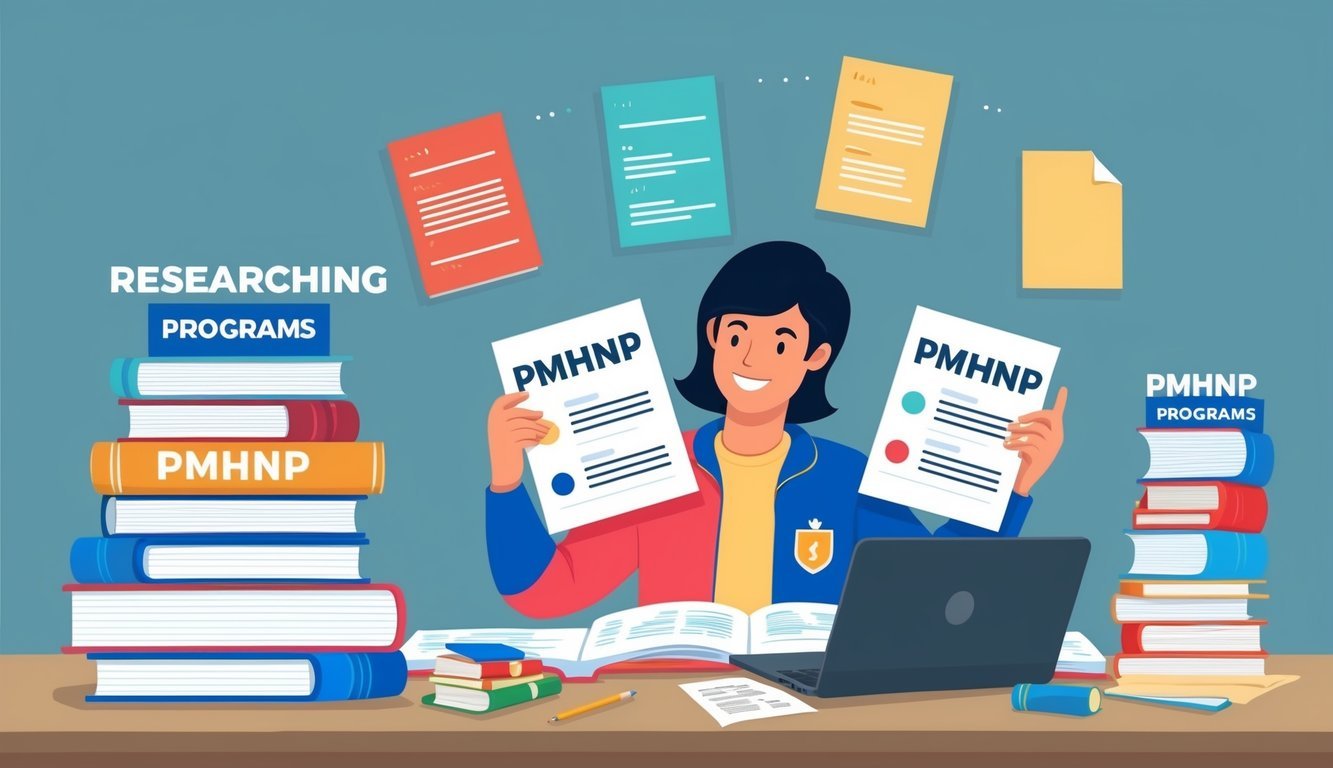Pursuing a career as a Psychiatric Mental Health Nurse Practitioner (PMHNP) can be both rewarding and impactful. A 1-year PMHNP program lets you obtain your certification while gaining essential skills to address mental health issues in patients. These accelerated programs are designed for nursing professionals looking to expand their expertise in psychiatric care without committing to multiple years of study.
You’ll find that many programs offer a combination of online coursework and hands-on clinical experience, making it feasible to balance your education with current job responsibilities.
For instance, institutions like Liberty University provide streamlined pathways that can help you complete your training in as little as one year.
This flexibility is an attractive option for many nursing professionals.
By enrolling in a 1-year PMHNP program, you position yourself to sit for the PMHNP certification exam more quickly, allowing for a faster transition into advanced practice roles in mental health.
With the rising demand for mental health services, your skills will be increasingly crucial in providing care and support to those in need.
Understanding the PMHNP Role
The Psychiatric Mental Health Nurse Practitioner (PMHNP) plays a crucial role in addressing mental health needs through assessment, diagnosis, and treatment.
They not only provide care for mental disorders but also work collaboratively with patients to enhance overall mental well-being.
Scope of Practice
PMHNPs have a wide scope of practice that includes assessing patients, diagnosing mental health conditions, prescribing medications, and creating treatment plans.
They are trained to handle various mental health challenges, including anxiety, depression, and other psychiatric disorders.
The role allows you to provide holistic care, addressing not just the symptoms but also the underlying factors affecting mental health.
PMHNPs often collaborate with other healthcare professionals, ensuring comprehensive treatment.
The following table summarizes key responsibilities:
| Responsibility | Description |
|---|---|
| Assess | Conduct thorough evaluations and histories. |
| Diagnose | Identify mental disorders using DSM-5 criteria. |
| Prescribe | Manage pharmacotherapy to address symptoms. |
| Treat | Develop and implement effective treatment plans. |
Importance in Mental Health Care
The role of a PMHNP is vital in today’s healthcare landscape.
As mental health needs continue to rise, PMHNPs offer accessible care for individuals facing mental health challenges.
They fill a significant gap in the mental health system, especially in underserved areas where psychiatric care is limited.
By focusing on patient-centered care, PMHNPs foster therapeutic relationships that aid recovery and promote well-being.
Your work as a PMHNP has a direct impact on improving public health by integrating mental health into overall health practices and policies.
This integration helps reduce stigma and encourages more people to seek help.
By collaborating with various stakeholders, PMHNPs also contribute to public health education, program development, and policy advocacy, thereby enhancing the healthcare system as a whole.
PMHNP Program Structure
The structure of a 1-year Psychiatric-Mental Health Nurse Practitioner (PMHNP) program is designed to equip you with essential knowledge and skills through a combination of coursework and clinical practice.
This program typically includes a robust curriculum, specific clinical requirements, and defined program duration.
Curriculum Overview
In a PMHNP program, you will encounter a curriculum that covers vital topics such as psychopharmacology, the neurobiology of mental disorders, and evidence-based practices for mental health care.
Core courses often include:
- Advanced mental health assessment
- Psychiatric diagnosis and management
- Therapeutic modalities
You may also engage in interprofessional collaboration training, preparing you for teamwork in diverse clinical settings.
Typically, the curriculum is flexible, especially for online PMHNP programs, allowing you to balance your studies with professional obligations.
Clinical Requirements
You are required to complete significant clinical experience as part of the PMHNP program.
This includes both direct and indirect clinical hours.
Clinical placements can involve:
- Psychiatric hospitals
- Community mental health settings
- Outpatient clinics
During these placements, you gain hands-on experience under the supervision of experienced practitioners.
You’ll be expected to demonstrate proficiency in assessment, diagnosis, and treatment planning for individuals with mental health disorders.
The total clinical hours may vary but often range from 500 to 700 hours, depending on the program.
Program Duration
Most 1-year PMHNP programs are designed to be completed in three semesters if attending full-time.
This condensed timeline allows you to quickly transition into practice.
Each semester typically includes both didactic coursework and clinical placements to ensure you are prepared for your role.
The focused duration enables you to maintain momentum in your education while entering the workforce efficiently.
Educational Pathways and Prerequisites

When considering a 1-year PMHNP program, it’s essential to understand the educational pathways and prerequisites required for admission.
This information will help you navigate your options effectively.
Nursing Degree Requirements
To begin your journey toward becoming a Psychiatric Mental Health Nurse Practitioner (PMHNP), you must first hold a nursing degree.
Typically, a Bachelor of Science in Nursing (BSN) is the minimum requirement.
Some programs also accept individuals with an Associate Degree in Nursing (ADN), offering a bridge to the BSN.
Upon obtaining your BSN, a Master of Science in Nursing (MSN) degree is usually necessary to qualify for PMHNP certification.
Alternatively, a BSN-to-MSN program allows you to transition directly from a bachelor’s to a master’s level education.
Here’s a quick reference table summarizing the typical nursing degree requirements:
| Nursing Degree | Description |
|---|---|
| BSN | Basic requirement for most programs |
| ADN | Acceptable but often requires a bridge |
| MSN | Required for PMHNP certification |
| BSN-to-MSN | Direct transition program available |
Advanced Practice Nursing Education
After meeting the nursing degree requirements, you need to complete an advanced practice nursing education program.
PMHNP programs usually strive to blend theoretical knowledge with clinical practice.
Thus, you must engage in courses focusing on mental health assessment, diagnosis, and treatment.
The MSN degree is essential, but there are also options for further specialization.
For example, if you already hold an MSN, a Post-Master’s APRN Certificate may be pursued to gain PMHNP qualifications.
In some cases, you might consider Doctor of Nursing Practice (DNP) programs, which provide a more in-depth focus on advanced practice roles.
Many programs emphasize the importance of clinical experience, requiring a minimum of 500 clinical hours for graduation.
Licensure and Certification

Navigating the licensure and certification landscape is crucial for your career as a Psychiatric Mental Health Nurse Practitioner (PMHNP).
You will need to understand the certification process and licensing criteria to ensure you meet all requirements.
Certification Process
To become certified as a PMHNP, you must pass the PMHNP Certification Exam administered by the American Nurses Credentialing Center (ANCC).
This exam evaluates your clinical knowledge and skills in psychiatric mental health.
Before sitting for the exam, ensure you have completed an accredited PMHNP program.
You’ll also need to hold an unrestricted RN license.
Once you pass the exam, you will receive national certification, which is a stepping stone to advancing your practice.
Licensing Criteria
Each state has unique licensing criteria for PMHNPs, which are essential for your practice.
Generally, you must possess an unrestricted RN license and a Master’s degree in nursing or a related field.
Most states require you to apply for an APRN Certification, which designates you as a certified advanced practice registered nurse.
This certification often includes submitting proof of clinical hours and practice experience.
Check your state’s specific requirements through the appropriate nursing boards to ensure compliance.
Career Outlook and Opportunities

The demand for Psychiatric-Mental Health Nurse Practitioners (PMHNPs) continues to grow significantly.
As mental health awareness increases, the need for qualified professionals in this field becomes more critical.
Job Growth
The U.S. Bureau of Labor Statistics projects a 38% growth in PMHNP roles by 2032.
This is much faster than the average for all occupations, providing ample career opportunities.
Salary Expectations
Here’s a brief overview of the salary range for PMHNPs:
| Experience Level | Average Salary |
|---|---|
| Entry-Level | $100,000 – $110,000 |
| Mid-Career | $115,000 – $125,000 |
| Experienced | $125,000 – $135,000 |
Salaries can vary based on location, experience, and the type of healthcare facility.
Work Settings
PMHNPs find employment in various environments, including:
- Hospitals
- Private practices
- Community mental health centers
- Substance abuse facilities
Holistic Care Approach
You will engage in holistic care, focusing on the overall well-being of clients.
Incorporating evidence-based practice ensures you provide effective treatment strategies for various mental health and substance abuse problems.
To explore more about the career outlook for PMHNPs, you can visit resources like Nurse Practitioner Job Outlook.
This increases your awareness of the vibrant opportunities available in this rewarding nursing career.
Selecting the Right PMHNP Program

Choosing a suitable PMHNP program is crucial for your career advancement.
Consider factors such as accreditation and available support resources to make an informed decision.
Accreditation and Quality
Accreditation ensures that a program meets high educational standards.
Programs like those offered by Ohio University and Georgia State are recognized for their quality.
Look for CCNE Accredited programs, as they indicate a commitment to excellence in nursing education.
When exploring options, investigate specific programs:
| Program | Accreditation | Duration |
|---|---|---|
| Ohio University | CCNE | 1 year (MSN) |
| Georgia State | CCNE | 1 year (MSN) |
| Walden University | CCNE | 1 year (MSN) |
| Purdue Global | CCNE | 1 year (MSN) |
Support and Resources
You need access to support and resources to succeed.
Consider programs that offer practicum assistance.
Institutions such as WGU and Liberty University provide robust support systems, including mentors and clinical placement services.
Look for features like:
- Clinical placement coordination: This helps you find suitable practicum sites.
- Networking opportunities: This connects you with professionals in the field.
- Academic resources: This offers libraries, research tools, and online learning platforms.
Programs that prioritize student support ensure you can thrive academically and professionally during your studies.
Researching these factors can help you identify the program that best meets your needs.

